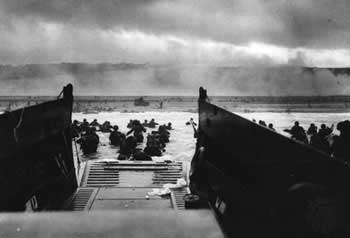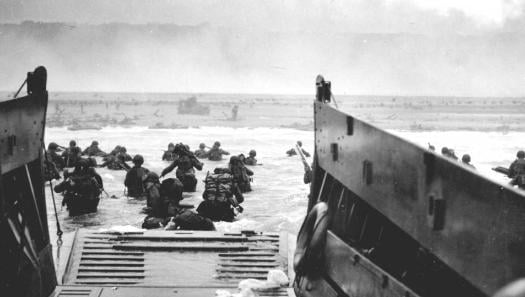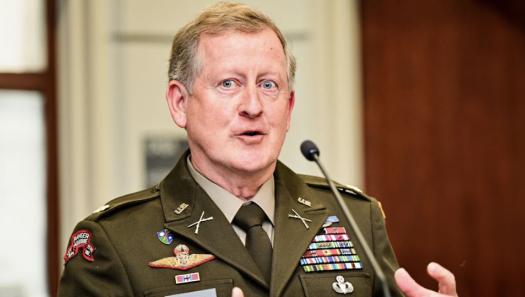Military & Veterans News
Vet News: Veterans Remember 'Days Before Longest Day'
Renita Foster, Army News Service


WASHINGTON, June 1, 2004 -- Sixty years ago today, more than 250,000 ground and airborne troops in England anxiously awaited one of the most anticipated events in world history.
They waited in marshalling areas called “sausages,” from their shape of long narrow fences. Units were sealed in upon arrival, vehicles were parked close to hedges and every item connected to the invasion was camouflaged under wire netting. The sausages were guarded by military police, and no one was allowed out. Not even campfires were authorized even though nights were cold.
Every Soldier received a brand-new weapon as well as a new uniform treated to ward off poison gas. It was not one they liked since the chemical treatment kept the material from “breathing.” The Soldiers froze in them at night, boiled in them during the day, and the material always smelled foul.
Long road marches and combat maneuvers were replaced by marathon card games and baseball games. Football was taken away because of too many injures. Libraries were available for reading and theaters were set up for showing movies with free popcorn. The favorites were “Mr. Lucky,” “Going My Way” and “Song of Bernadette.” And months of speculation about an invasion was finally over.
“We had a pool going as to when and where we were headed,” grinned Pete Rubino, a 29th Infantry Division veteran who is traveling to Normandy to be a guest of the French government for the 60th Operation Overlord anniversary. “There were briefing tables explaining about the mission we could study. And while we still didn’t know the exact date, we figured it had to be the 5th, 6th or 7th.”
Joe Lennert, a 9th Air Force veteran and resident of the New Jersey Veterans Memorial Home at Menlo Park, N.J., was placed in a coastal town completely encircled by barbed wire. Vast amounts of supplies were nearby under heavy security, but Lennert didn’t think it had anything to do with an invasion. Not even after attending a speech by Eisenhower, followed by the distribution of rations and ammunition, did Lennert believe he was about to be a part of the greatest Allied invasion in history.
“It wasn’t until I was four or five miles from the beach and saw flak from the German guns I realized this was it!” said Lennert.
The sudden appearance of bread, eggs, steak, ice cream and lemon meringue pie was another indicator to many Soldiers their lives were about to change. “We were thrilled to get all this great food even though we called it ‘fattening us up for the kill,’” laughed Rubino.
Max Brudner, of the 186th Field Artillery, indulged in steak for breakfast, lunch and dinner, while Joe Lynch, an 82nd Airborne Division Glider trooper, went for the scrambled eggs. “I wasn’t that particularly fond of eggs,” said Lynch, “but when you’re hungry anything is good, and I remember being very hungry those last few days.”
Once locked aboard the cramped vessels, the endless ordeal of waiting began. Monotony was relieved by stretching out anywhere possible for naps, reading or writing letters as well as joining the never-ending poker and dice games. One imaginative group lowered the Landing Craft, Tank (LCT) assault ramp to the water’s edge, affording the Soldiers a diving platform. Other conscientious GIs washed and strung their laundry between Sherman tanks. And in one ship’s operation area, next to the maps outlining Operation Overlord’s battle plans, a strategically placed beautiful pinup girl lounged on what was undoubtedly a far safer beach.
The long waiting also meant plenty of time for just thinking. While waterproofing his weapon, Brudner suffered the mounting anticipation of battle. His group of men were particularly close since they’d served together prior to the war. “We lived closer than brothers in a lifetime. We trained, ate, slept and went to the latrine with each other. The only thing different this time would be the live ammunition coming our way.”
Sal Mule, then a platoon sergeant with the 1st Inf. Div., indulged himself in a bottle of cognac he’d acquired. “She and I were good friends,” laughed Mule, another resident of the New Jersey Veterans Memorial Home who to this day refuses to say where he got the liquor.
Despite the overwhelming feeling at all the gear he was required to carry, Nick Merlo made sure there was a special place for his good luck rosary. “I never left that anywhere,” declared Merlo, also a veteran of the 29th Inf. Div. So devout was Merlo, he opted to spend his time in the chapel instead of joining the card games. “That’s where me and my rosary felt our best,” said Merlo, now a resident of the New Jersey Veterans Memorial Home.
Late in the evening of June 4, Lynch was in the middle of a craps game when the announcement was made that it was time to go. The excessive weight of the duffel bag and musette bag made walking and climbing aboard the glider difficult. After Lynch found his seat he found he didn’t want to think about anything. “We didn’t talk. We just waited,” said Lynch.
Soldiers all over southern England were poised for Operation Overlord to commence when an outside factor nearly caused the undoing of intense months and years of detailed planning and training. Horrendous weather consisting of reduced visibility and excessive winds forced a 24- hour postponement.
O.B.Hill, 82nd Airborne Division, was making the most of a bad hand in poker when it was announced the invasion was temporarily on hold. Hill was an annual visitor to Normandy, Holland and Belgium before he died this year.
While some Soldiers welcomed another chance to study the sand table outlining the drop zones, others felt frustrated sweating out another day for the combat jump. Many were disappointed about waiting for the opportunity to employ all the airborne skills they’d spent years honing.
“I think there were as many different thoughts as there were paratroopers, but the common feeling was to get on with it,” Hill said. Trading the unlucky poker game for another movie, Hill saw “The Littlest Angel,” starring Margaret O’Brien. “I remember that film’s title because I was sure it would be my last for a long time and it was.”
Lynch doesn’t remember exactly how long he was on board the glider, but he distinctly recalled an officer suddenly showing up, blowing a whistle and announcing, “Everything’s off.”
“We felt let down,” said Lynch. “We were all psyched up to go, sitting in the gliders with our grand M-1s between our knees ready for action. Nobody said very much until later and then it was mostly about being disappointed.”
Mule’s reaction of Operation Overlord’s delay was one of nonchalance since he’d already been in the North Africa and Sicily invasions. Figuring it would come sooner or later, he looked at it as just another day of living. “I didn’t think I was going to make it through the last two, yet here I was,” said Mule. “I was more upset about not being able to get extra cognac.”
The cancellation of the invasion was something Rubino never knew. And he adamantly says he’s thankful he didn’t. “I’m glad I escaped having to think I was going and then not and then it’s back on again.”
Despite the bad weather, Rubino slept on the deck the night of the 4th. The notion of being below with so many Soldiers made him feel claustrophobic. And it became harder not to wonder and feel frightened about the invasion. Rather than talk or speculate about what might happen to him and his fellow Soldiers, Rubino decided it was better to just not think at all. For comfort, he relied on the endless training that had taught him to stay calm and treat the mission just like it was another day.
Anticipation began mounting once again on June 5. Mule handled it by reminding himself there was nothing he could do. His two previous invasions had been hard and this was just one more. “You just keep wondering if this one is going to be your last,” he said fatalistically.
When the order came again, Lynch wondered if there would be another delay. After boarding the glider in the late night hours of June 5 and feeling the aircraft ascend into the dark night, he knew the invasion was on.
When his LST began heading for Normandy, Merlo felt his fears intensify. “I wasn’t any John Wayne. And anyone who says he wasn’t afraid is crazy. The only worry I’ve known that compares to leaving for the invasion is when I got married.”
Lennert also prayed as his unit came closer to the beach. He told God he didn’t mind giving his life for country, but if possible could the Lord please spare him and let him go home. “We kept going by talking to each other and saying things like, ‘Hey, we’re going to Paris.’ Paris became the ultimate goal. God must have heard me because I rode a truck into Paris under the Arch of Triumph the day Paris was liberated.”
Brudner kept repeating the same prayer as his vessel headed for Omaha Beach-he didn’t want to be an unknown Soldier or lose a limb. “I just wanted to get home in one piece.” Around Brudner, Soldiers still played cards and talked abut home and girls.
During the ride over, Lynch looked down and saw water. Then Normandy came closer and the guns opened up. “I thanked God the ‘Krauts’ were lousy shots,” said Lynch who landed in Normandy shortly after midnight. “It was near a beach but I don’t remember which one. There were twenty-something of us. Upon landing, we busted out shouting with our rifles.”
Rubino knew there would be no turning back this time when he heard the shrill blast of the horn across the choppy waters of the channel. As the ships headed out to sea, he turned to faith for strength and courage. “My mother was a very religious woman and I prayed to her. I honestly believed she would help me get through it. I was still saying that same prayer when I saw Omaha Beach that morning.”
On June 6, 1944, more than 8,000 aircraft flew in support of 5,000 ships and craft that carried 175,000 men across the English Channel. The first transmission sent that morning read, “Under the command of General Eisenhower, allied naval forces, supported by strong air forces, began landing Allied armies this morning on the northern coast of France.”
SOURCE: VNIS


